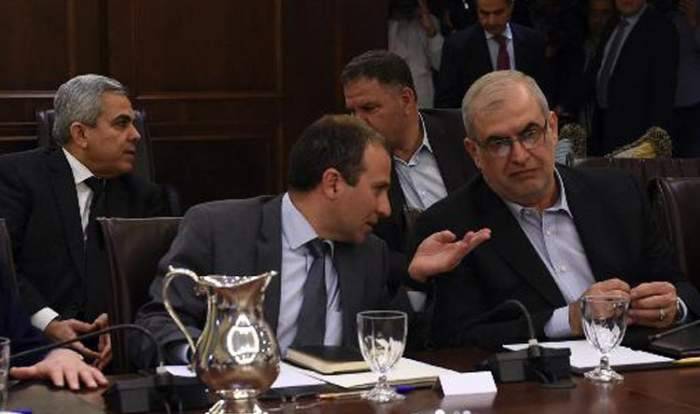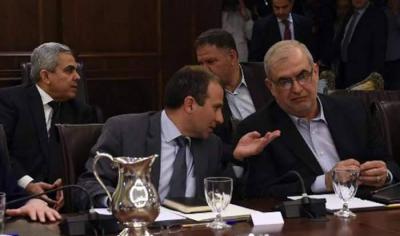The ongoing dialogue between "Hezbollah" and the President of the "Free Patriotic Movement," MP Gibran Bassil, is racing against time in an attempt to establish a presidential agreement that would rearrange the cards, enabling the party to include it in the agenda of meetings led by the French envoy to Lebanon, Jean-Yves Le Drian, during his third visit to Beirut. This effort aims to move the election of the President of the Republic out of the current impasse, particularly hoping that Bassil's stance will shift towards supporting the candidacy of the former MP Sleiman Franjieh, the head of the "Marda" party, for the presidency.
"The Middle East" pointed out that the dialogue is progressing slowly, characterized by routine and stagnation, contrasting the party's expectation that the political conditions now favor Bassil's engagement in supporting Franjieh's candidacy. Sources following the stages of the dialogue noted that the discussions are still in a foundational phase and have not reached the desired objectives. Nonetheless, they have agreed to form a joint committee led by MP Alan Aoun from the "Free Patriotic Movement" and Abdul Halim Fadlallah from "Hezbollah," tasked with developing an initial proposal concerning expanded administrative and financial decentralization.
The slow pace of the dialogue between "Hezbollah" and Bassil, as noted by the sources, is not due to the heightened public tensions between the "Amal Movement" and the "Free Patriotic Movement," exemplified by the response from Ali Hassan Khalil, the political assistant to the Speaker of Parliament, to President Michel Aoun and Minister Bassil, but rather because Bassil conditionally demands the legalization of what he presented in his political paper submitted to the party’s liaison officer, Wafiq Safa. In return, Hezbollah has committed to supporting anything agreed upon between the two parties, with the understanding that it will be ratified by Parliament following the election of a president.
The same sources emphasized that while "Amal Movement" is monitoring the overall dialogue between Hezbollah and Bassil, it is not a party to it and felt compelled to respond to the attacks it faced from President Aoun and Bassil. They question how Bassil plans to correct his relationship with his ally in the understanding paper while simultaneously initiating side battles. They assert that "Amal" does not oppose the enactment of administrative and financial decentralization but insists on doing so within the framework of adhering to the Taif Agreement, avoiding any deviations from its texts that could facilitate political exploitation of decentralization.
They perceive "Amal" as open to continuing the implementation of the Taif Agreement but approaching with caution any attempts to dismantle the state's public finances under the pretext of achieving financial independence linked to administrative decentralization, provided there is a balanced financial distribution that ensures service provision without disintegration. This approach aims to maintain the state's centrality in matters concerning security, defense, foreign policy, and projects fostering communication between Lebanese regions.
They question how Bassil and his political team object to essential legislation amidst the ongoing vacancy in the presidency while concurrently demanding legislation for what is agreed upon between Hezbollah and the "Free Patriotic Movement." They state that Hezbollah commits to working toward legalizing the agreements made between the two parties in exchange for Bassil's resolution to support Franjieh's candidacy.
The same sources confirm that the dialogue between Hezbollah and Bassil will not progress if Bassil insists on extracting preemptive concessions from Hezbollah without a prior commitment to supporting Franjieh. They argue that simply endorsing Franjieh will inevitably secure a parliamentary majority enabling the legalization of what is agreed upon, given Hezbollah's considerable influence in promoting the agreement among its allies.
They add that Hezbollah remains silent and has requested its officials not to escalate reactions, as it is crucial to provide an opportunity for the dialogue to mature, which is expected to conclude the differences with the "Free Patriotic Movement" based on supporting Franjieh's candidacy. Moreover, it is inappropriate to engage in a barter with Bassil imposing that Hezbollah must adhere to whatever is agreed upon in their renewed dialogue with its longstanding rival, in exchange for Bassil's inclusion of Franjieh’s name among presidential candidates after previously opposing his candidacy.
They assert that successfully navigating the dialogue requires a mutual commitment: Hezbollah must strive to market what is agreed upon with Bassil, and in return, Bassil must pledge his support for Franjieh. They maintain that the dialogue cannot be sustained without adhering to this equation, as middle-ground solutions will neither advance nor delay the process of rearranging the cards in favor of advancing Franjieh over the opposition candidate, should the opposition persist in nominating Azour or deem it necessary to agree on an alternative candidate.




